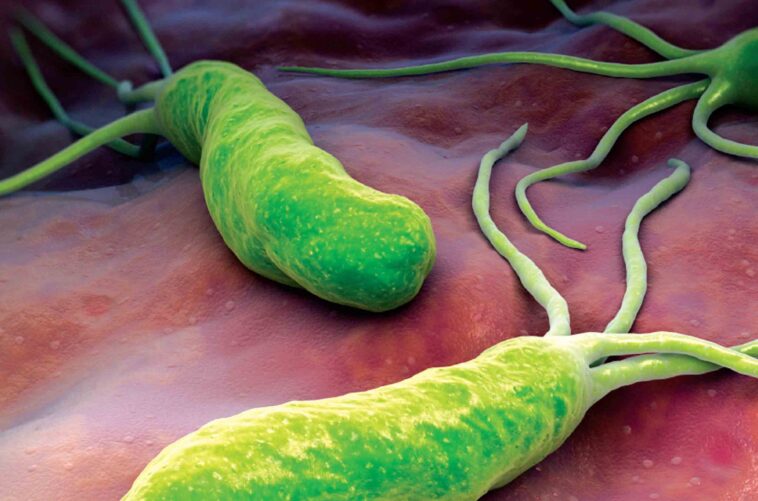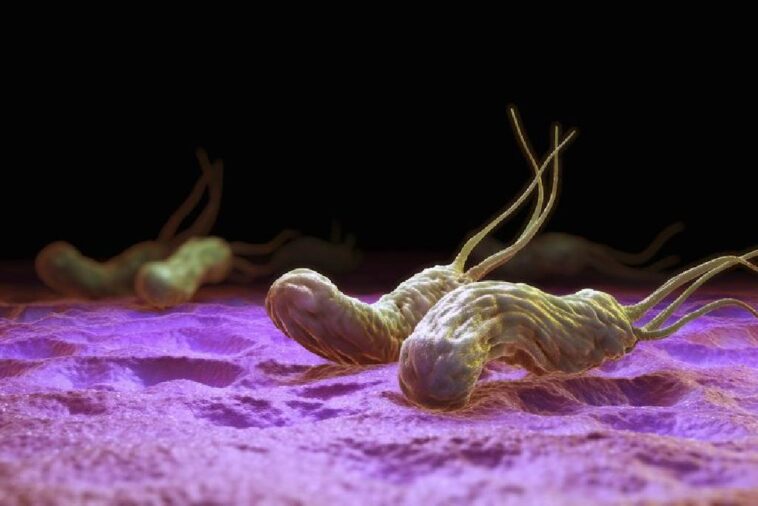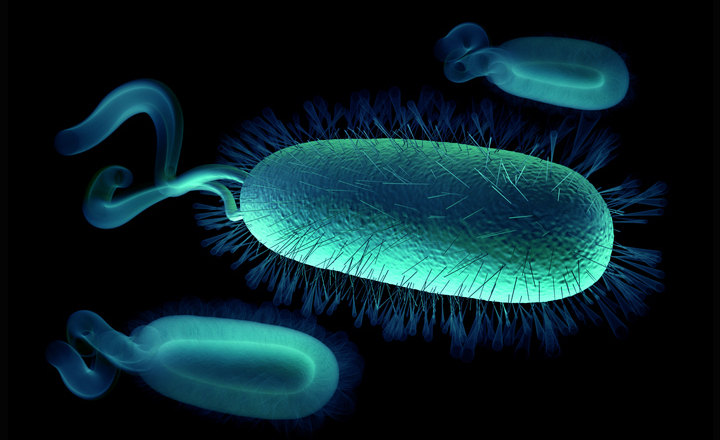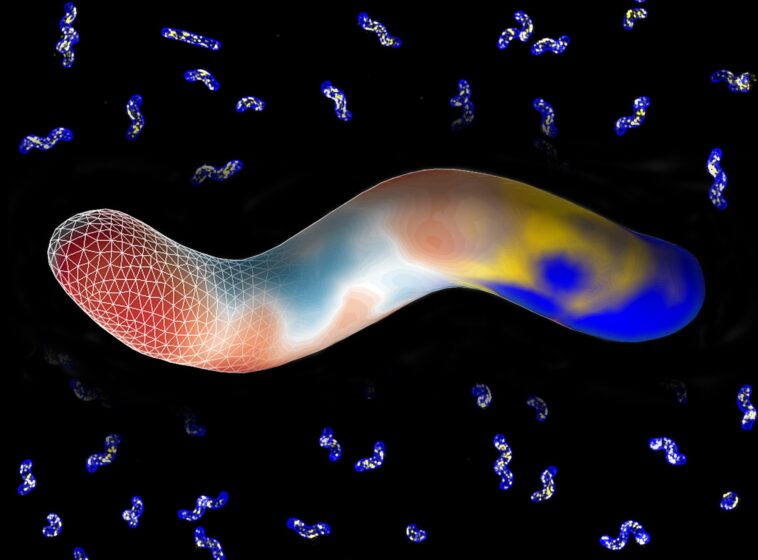A type of bacteria that develops in the digestive tract and has a tendency to attack the stomach lining is H. pylori or Helicobacter pylori. It was previously known as Campylobacter pylori. This bacteria is present in 50% to 75% of the world’s population and does not cause illness in most people. This infection is more common in developing countries. H. pylori infection is likely to occur in children who live in crowded conditions and areas with poor sanitation. Infections can spread from one person’s mouth to another. H. pylori bacteria is found in saliva, plaque on teeth, and feces. Scientists believe that H. pylori may spread through H.pylori contaminated water and food.
What is H. pylori infection?

H. pylori infection occurs when the H. pylori bacteria infect the stomach. This bacteria can cause an infection in the stomach or duodenum and is the most common cause of peptic ulcer disease. H. pylori can irritate and inflame the stomach lining. If left untreated, long-term H. pylori infection may lead to stomach cancer. Usually, this infection is harmless and doesn’t cause symptoms, however, they are responsible for the majority of ulcers in the stomach and small intestine. Only 20% of infected people experience symptoms. Symptoms may include stomach pain, weight loss, and bloody vomit. Nearly two-thirds of the world’s population has this infection in their bodies.
Causes of H. pylori infection
This infection spread from one person’s mouth to another. And it may also transmit from feces to the mouth, which can happen when a person does not wash their hands thoroughly after using the bathroom. One can get H. pylori by water, food, even utensils and can also pick up the bacteria through contact with the saliva or other body fluids of infected people.
H. pylori bacteria multiply in the mucus layer of the stomach lining & duodenum. And these bacteria secrete an enzyme called urease which converts urea to ammonia. Ammonia protects the bacteria from stomach acid. When H. pylori multiply, it eats into stomach tissue and leads to gastritis or peptic ulcer. Many people are infected by H. pylori during their childhood, but adults can get it. The bacteria live in the body for years before symptoms start. Most people will never get ulcers. But doctors are unsure why only a few people get ulcers after an infection.
Who is at risk?

Although infection is often acquired in childhood the risk for this infection partly depends on the environment and living conditions. The risk of getting this infection is higher when a person:
- Shares housing with someone who is infected with H. pylori
- Lives in overcrowded housing
- Lives in a developing country
- Is living without a reliable supply of clean water
Helicobacter pylori symptoms
Most of the time infected people will never have any signs or symptoms. But when symptoms occur it may include:
- Burning pain in the abdomen
- Lack of appetite
- Nausea
- Fever
- Excessive burping
- Bloating
- Unintentional weight loss
See the doctor immediately if you experience:
- Trouble swallowing
- Anemia
- Blood in the stool
- Trouble breathing
- Dizziness or fainting
- Pale skin color
- Vomit that has blood
- Severe stomach pain
According to a study, people with H. pylori infection may be up to 6 times more likely to get stomach cancer. Early treatment can help reduce the damage and may help reduce the risk of stomach cancer and other problems.
Possible symptoms of stomach cancer may include:
- Belly pain
- Loss of appetite
- Indigestion
- Feeling full without eating very much
- Vomiting
When people experience these symptoms, they should consult their doctor. And these symptoms may also be caused by other infections, it is essential to get tested and treated if necessary. If you are from the US, DxSaver.com has got you covered for the H Pylori testing.
H. pylori infections diagnosis

The doctor will ask about the medical history and family history of the disease. Nonsteroidal anti-inflammatory drugs (NSAIDs) can also damage the stomach lining, so it’s essential to find out what’s causing the symptoms to get the right treatment.
During a physical exam, the doctor will examine the stomach to check for signs of bloating, tenderness, or pain. Doctors may also perform many other tests and procedures to help confirm their diagnosis:
- Blood test: During a blood test a healthcare provider will draw a small amount of blood from the arm or hand. And this will be sent to the lab for analysis. It is important to note that, this test is only helpful if a person has never been treated for H. pylori earlier.
- Stool test: A stool sample is required to check for signs of H. pylori in the feces.
- Breath test: During a breath test, you’ll swallow a preparation containing urea. When the bacteria are present, it will release an enzyme that breaks down this combination and will release carbon dioxide, which a special device then detects.
- Endoscopy: The doctor will insert a thin, long instrument called an endoscope into the mouth and down into the stomach and duodenum. The camera which is attached will send back images on a monitor for the doctor to view. The abnormal areas will be inspected and if necessary, the doctor will take samples from that area.
Treatment for H. pylori
When a person has ulcers caused by H. pylori, they need treatment to kill the germs. Normally it takes 1 to 2 weeks of treatment to get better.
Treatment may include:
- Antibiotics like amoxicillin, tetracycline (Sumycin), clarithromycin (Biaxin), metronidazole (Flagyl), or tinidazole (Tindamax).
- Bismuth subsalicylate may also help kill H. pylori along with antibiotics.
- Medicines that block the chemical histamine, that prompt the stomach to make more acid. They are nizatidine (Axid), cimetidine (Tagamet), famotidine (Fluxid, Pepcid), or ranitidine (Zantac).
When an infected person doesn’t take antibiotics the right way, bacteria in the body can become resistant to them and makes the infection harder to treat. It is essential to consult the doctor when people face any side effects. One to two weeks after treatment, doctors may test stool or breath to make sure the infection is gone.
Complications

H. pylori may lead to peptic ulcers, but the infection or the ulcer itself can lead to more serious complications. Some studies show that people with this infection may also have an increased risk of stomach cancer. Apart from these complications, it may also cause inflammation of the stomach lining.
Prevention:
- Wash your hands after using the restroom and before preparing or eating food.
- Drink clean water and use clean water for food preparation.
Although stress and spicy foods do not cause ulcers, they can keep them from healing quickly or make the pain worse. It is a good idea to talk to the doctor about ways to manage stress and improve diet.





